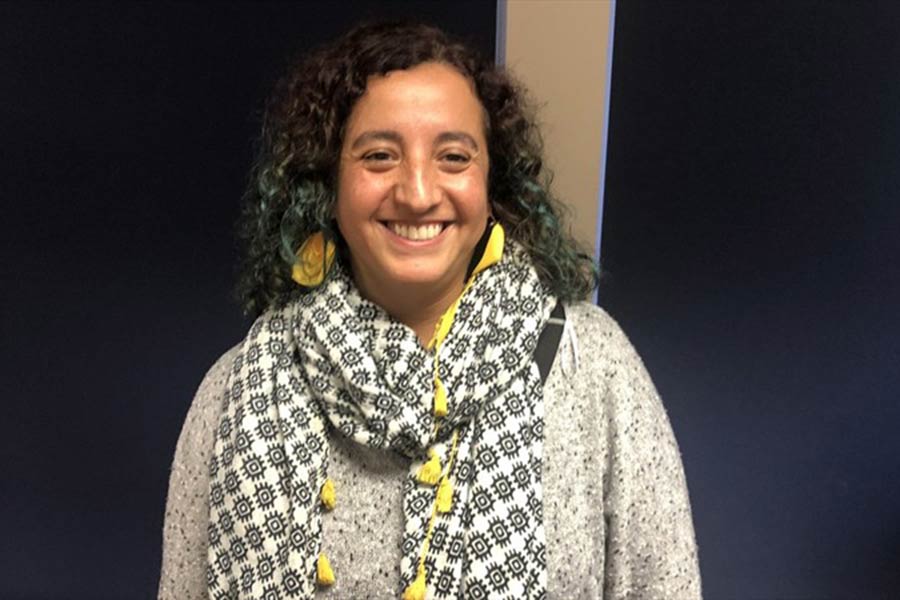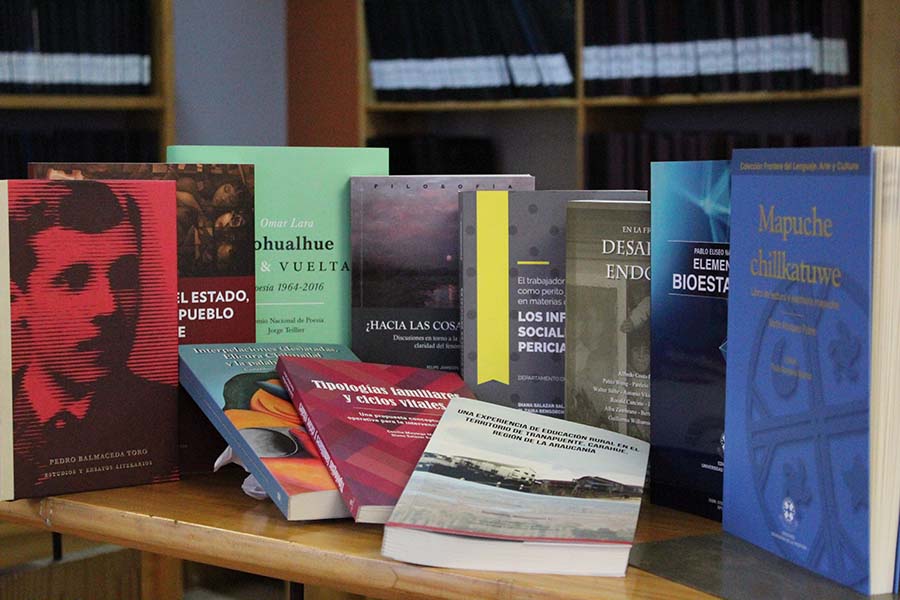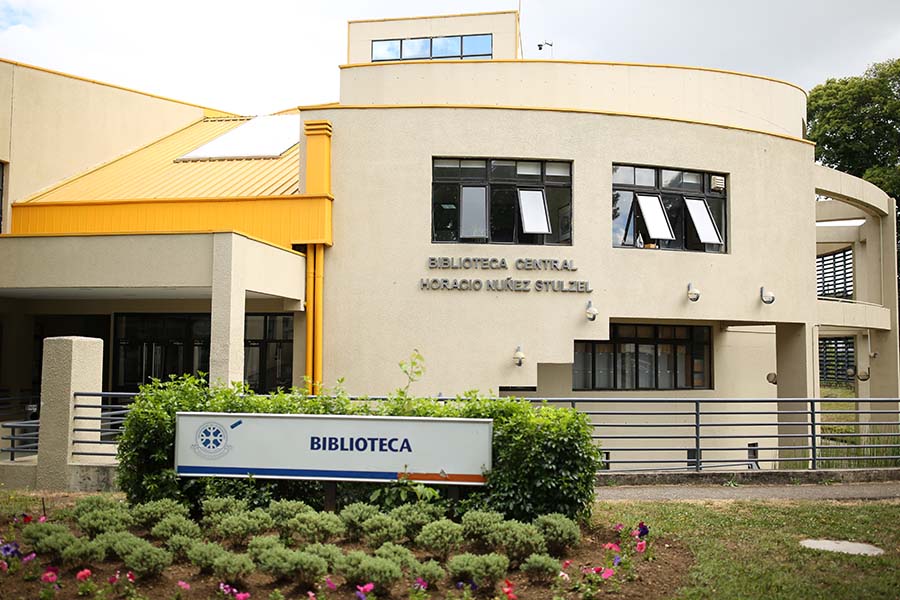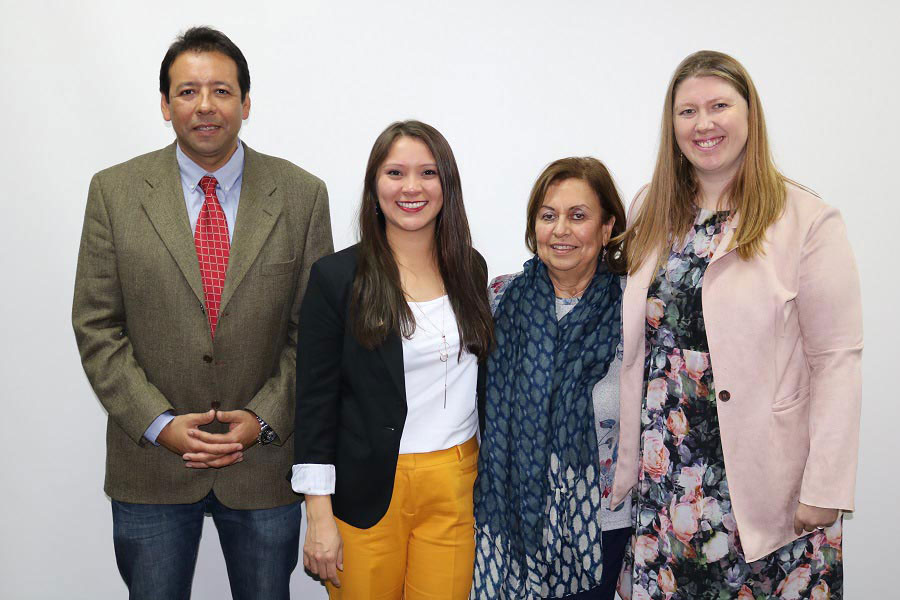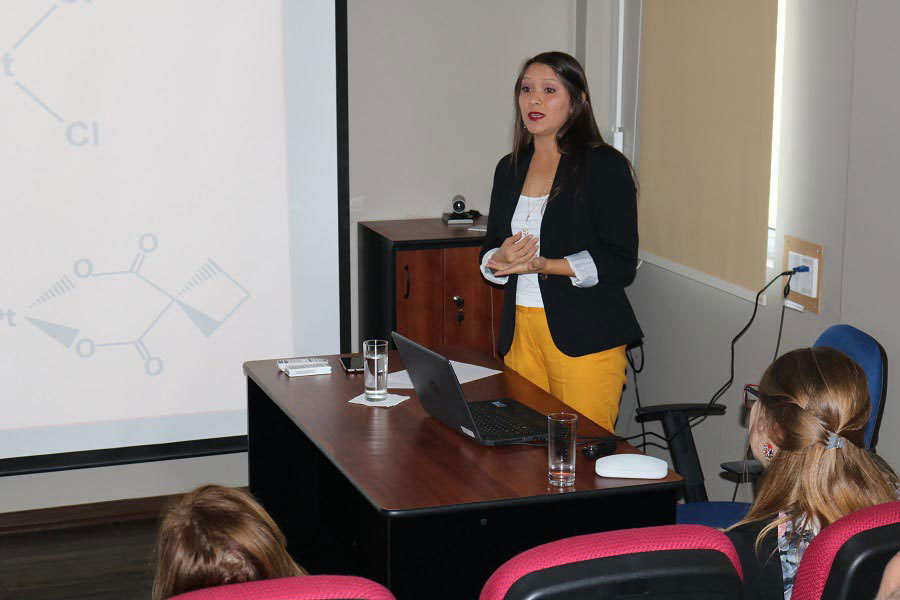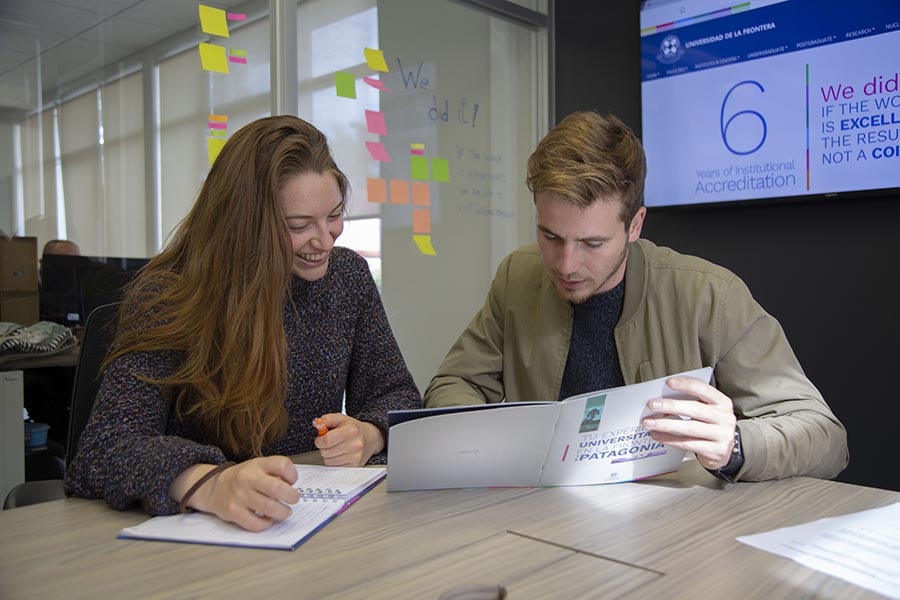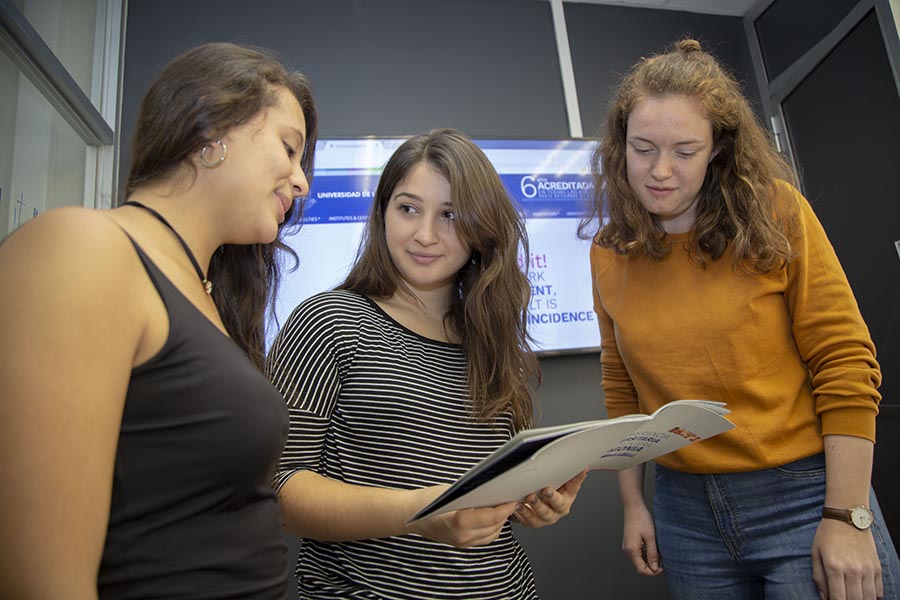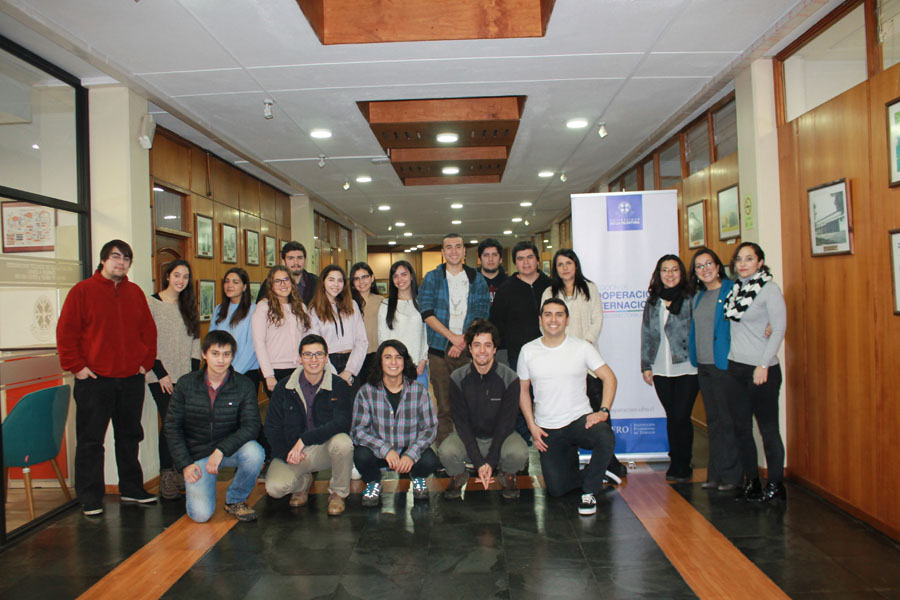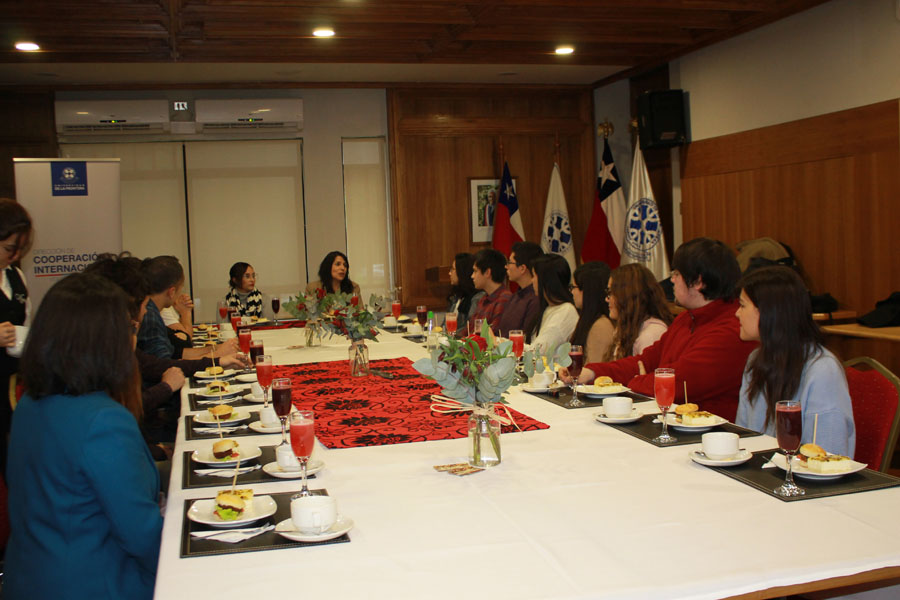|
After several weeks of campaigning, the aspiration to bring young spirit into a significant position in higher education became a reality on Wednesday, July 24, when Natacha Pino Acuña was elected the new university rector of the University of Aysén, a Chilean state university, by the 27 authorized academic voters. The new rector elected is going to assume office on September 2, 2019 until 2023. |
It is a milestone in the history of state universities in Chile and goes in hand with the current demands of the society that seek stronger presence and representativeness of women in political decision-making positions. Natacha Pino Acuña was elected the first female university rector of one of the universities that are part of the CRUCH (Council of Rectors of Chilean Universities) state universities by her peers. She graduated in Civil Industrial Engineering from the Universidad de La Frontera (UFRO) in 2004 and demonstrated her commitment to the development of the regions of Chile since the beginning. This belief, which was also marked by an even greater vocation: the desire to pass her knowledge on to new generations, showed her the path that kept her more than seven years in the position of the director of the UFRO undergraduate program in Civil Industrial Engineering with specialization in Computer Science and in Bioprocesses. She was well appreciated by her students and the academic community of the Universidad de La Frontera and as the new rector of the University of Aysén, she sustained that this new challenge she is assuming today is an important task for the present and the future. “I accept this great challenge because I strongly believe that this new way of doing things, with a collaborative and effective governance model, will convert us into an institution of excellence in the region and the country,” she said. After several weeks of campaigning, the aspiration to bring young spirit into a significant position in higher education became a reality on Wednesday, July 24, when Natacha Pino Acuña was elected the new university rector of a Chilean state university by the 27 authorized academic voters. The Electoral Board informed that Natacha Pino got 14 votes out of 26 votes validly cast. The other 12 votes went to Maria Teresa Marshall. The new rector, elected by a majority of 53.85%, is going to assume office on September 2, 2019 until 2023. The University of Aysén transmitted the first impressions through its channels of institutional communication. "This has been an intense process. It was a month of hard work, designing the proposal together with my academic colleagues. It is a very important step for our university community, regarding the commitments and expectations we generated, but also regarding the result of the election, which was very close. It makes us think that we do not have an absolute advantage and that our peers who did not support our candidacy also have to be part of this new stage and that we have to include them in this project, what will be one of our first tasks,” the new university authority explained. Natacha Pino Acuña graduated from the Universidad de La Frontera in 2004. Afterwards, she worked for several years as an academic at the UFRO Faculty of Engineering and Science, led the management team of the Training Node of the Engineering Project 2030 and was the person in charge of the Social Responsibility Program. She accepted the challenge to contribute to the installation process of the University of Aysén and to lead the undergraduate program in Civil Industrial Engineering in November 2018. She has a Master’s Degree in Advanced Production, Logistics and Supply Chain Engineering from the Polytechnic University of Valencia (Spain) and is currently studying horticultural supply chains for her doctoral thesis. In addition, she is an active member of the executive coordination of the Chilean Network for Learning Services. Since the beginning of her professional career, she has been participating in different projects of local and regional interest, carrying out work that is linked to the municipalities, public services and territorial organizations, mainly in further training, consultancies and technical assistance in fields such as planning, strategies, quality accreditation systems, management control systems, entrepreneurship and project formulation, while putting industrial engineering at the service of the community, both in the public and private sector.
Photography by: University of Aysén
Written by: UFRO Communications Office |
|
The academics of the Universidad de La Frontera will be able to disseminate their work in academic spaces of high importance in the world. This is another step towards internationalization. |
The cultivation and dissemination of knowledge, as well as the participation of our academics in international networks, are some of the main tasks of the Universidad de La Frontera (UFRO). In a new stage of development, UFRO University Press - Ediciones UFRO wanted to be part of these tasks and to continue the improvement of its processes and the strengthening of its advisory councils. It has taken significant steps in the elaboration of an agency that works together with important international publishing houses. This is what Dr. Carlos del Valle, the director of the UFRO Office of Libraries and Information Resources, pointed out: “The purpose of these co-edition agreements is, on the one hand, to make our publications more visible abroad and, on the other hand, to contribute to the scope of internationalization at our university. Therefore, we have been seeking for agreements with university publishing houses in Latin America and Europe and with other prestigious publishing houses in Europe that express their recognition towards our university this way. We are close to an important milestone for our university.” AGREEMENTS The co-edition agreements are the following: Firstly, the Global Culture & Politics Collection will be published in co-edition with Groningen University Press in the Netherlands this year, in Spanish as well as in English. Secondly, the Manuals of University Teaching will be published in co-edition with the Editorial Universidad de La Plata (University of La Plata) in Argentina. At the same time, there are different book proposals that are being reviewed for co-edition by the publishing houses of the Anaya Group, whose focus are these manuals and general teaching materials. Thirdly, the collections Estudios Postcoloniales (Postcolonial Studies), of Trans-disciplinary Investigations and Historias Críticas del Presente (Contemporary Critical Stories), will publish their books this year in co-edition with Éditions de la Maison des Sciences de l'Homme (FMSH) (literally “House of the Sciences of Man Editions”) in France and the Latin American Council of Social Sciences (CLACSO). Finally, the editorial adds alliances with two other important publishing houses, with which other publications are being evaluated. One of them is the Editorial Brill in the Netherlands, which was founded in 1683 and is one of the oldest publishing houses in the world. And the other one is Editions L'Harmattan, one of the biggest publishing houses in France. EXTERNAL ADVISORY COUNCIL GETS STRENGTHENED Additionally, and in accordance with the promotion of UFRO University Press, Dr. Jose Manuel Rodriguez, the coordinator of Ediciones UFRO, addressed the incorporation of new members to the External Advisory Council, who are added to a list of well-known academics of different fields of knowledge and literature, and said: “It is quite commonplace to talk about the need to create networks, but it is not easy to make them effective, since we need a direct partnership with those we want to work with.” “We always try to invite people we have effectively accomplished different tasks with, to ensure that the partnerships we have are effective and long-lasting. That is very important for the academic community, since the purpose of this international council is to open a space that is useful for us and that benefits everybody who is interested in promoting their texts,” the coordinator pointed out.
 Written by: Katherine Chavez Written by: Katherine ChavezUFRO Office of Libraries and Information Resources |
UFRO Ph.D. Graduate studied genes involved in the resistance to drugs used in ovarian cancer therapy
|
The Researcher Tamara Viscarra Alvarez studied a way to sensitize cell lines and laid the basis for the introduction of a new way to treat cancer in patients that do not respond to the conventional therapies. |
Cancer is one of the main causes of death in developed countries. Carboplatin is one of the most used drugs for the treatment and one of its benefits is that there are less side effects. Although the different cancer treatments show positive effects, patients often develop resistance to chemo-therapy drugs, what reduces its effectiveness. The main objective of the research work of Tamara Viscarra Alvarez was to study the expression of genes that are associated with carboplatin in ovarian cancer cell lines as a mechanism of reversal of the resistance phenotype. This study led her to obtaining her Ph.D. degree in Sciences with specialization in Applied Cellular and Molecular Biology from the Universidad de La Frontera. “The objective of my research was to modulate the resistance to carboplatin in ovarian cancer cells. Therefore, we carried out a series of trials which allowed us to establish that the SFRP4 gene in combination with the treatment with carboplatin allows reducing the resistance in ovarian cancer cells,” Dr. Viscarra explained. One of the conclusions of the study was that, thanks to the use of carboplatin in combination with the overexpression of the SFRP4 gene, we could sensitize resistant cell lines in order to achieve a better response to the treatment with carboplatin. “Regarding the advantages the results of this study present, we will be able to reduce the side effects a lot of patients present after chemotherapy and to reduce the rates of death in patients that have to undergo a second chemotherapy since they do not work properly. Thanks to this, we can establish a new treatment, particularly for those patients who do not respond to the conventional therapies,” Dr. Viscarra added. The thesis of Dr. Viscarra was carried out in the Laboratory of Molecular Pathology of the Universidad de La Frontera, under the supervision of Dr. Priscilla Brebi Mieville. She joined the Doctoral Program in 2013, after finishing her studies in Biotechnology at the Universidad de La Frontera. “The Ph.D. Program allowed me to dream. It did not limit us to investigate one particular issue, but allowed us to evaluate all options, requirements and desires we got in scientific research and to achieve that in the best way possible. You have a lot of possibilities: you can do stays abroad and, besides, you can count on the constant support the program offers to its students,” she sustained. During the elaboration of her doctoral thesis, Dr. Viscarra achieved six publications in ISI indexed journals and two sent articles. In addition, she made 13 presentations at international congresses and 17 at national congresses.
 Written by: UFRO Communications Office Written by: UFRO Communications OfficeThis email address is being protected from spambots. You need JavaScript enabled to view it. |
|
UMAP, an organization of governmental and non-governmental representatives in higher education, brings outstanding institutions together and also benefits the Universidad de La Frontera through the different agreements that strengthen the international community. |
The Universidad de La Frontera continues the process of internationalization from its essence, with a cross-disciplinary outlook, being oriented towards communication, the creation of networks and new alliances with strategic partners. The International Affairs Office, always working in benefit of the university community, ultimately was able to make several important partnerships formal. In this regard, the alliance with the University Mobility in Asia and the Pacific (UMAP) Network, that brings well-known institutions in Asia and the Pacific together, clearly stands out, since it allows UFRO students to realize internships and stays abroad for four to six months in countries and territories that are part of UMAP. This possibility is open for institutions of 35 countries: Australia, Brunei, Cambodia, Canada, China, Ecuador, Fiji, Guam, India, Indonesia, Japan, Kazakhstan, Korea, Kyrgyz, Laos, Macao, Malaysia, Mexico, Mongolia, Myanmar, New Zealand, Papua New Guinea, Peru, Philippines, Reunion, Russia, Samoa, Singapore, Taiwan, Thailand, Timor-Leste, the USA and Vietnam. UNDERGRADUATE AGREEMENTS Within the framework of internationalization, the Universidad de La Frontera already increased the number of new or renewed partnerships with high-prestige institutions in 2019. A total of 16 agreements with institutions such as: Sungshin University (South Korea), Jinan University (China), Universitat Rovira I Virgili (Spain), Technical University Braunschweig (Germany), Catholic University Eichstätt-Ingolstadt (Germany), University of Economics and Human Sciences in Warsaw – Faculty of Management and Finance (Poland), University of Basel – Faculty of Humanities and Social Sciences (Switzerland), and University of Perugia – Department of Philosophy, Social Sciences and Education (Italy). In addition, the UFRO has different agreements with the National Autonomous University of Mexico, the Michoacan University of San Nicolas of Hidalgo (Mexico), the University of the Republic (Obstetrics) in Uruguay, the Dom Bosco Catholic University (Brazil), the National University of Córdoba (Faculty of Dentistry) in Argentina, the University of Business and Social Sciences (Faculty of Medicine) in Argentina, National University of Comahue – Faculty of Agricultural and Forestry Science (Argentina) and the Pontifical Bolivarian University, Bucaramanga Campus (Colombia). ATTRACTION OF STUDENTS Within the field of studies in Chile, the Chilean Agency for International Cooperation and Development (AGCID) initiated the Manuela Saenz Program for Student Mobility that seeks to strengthen student exchange and stays of undergraduate students from Ecuador and Paraguay, who completed at least half of their studies, for one semester. The cooperation of the UFRO with educational establishments in both countries identifies the relations with the Catholic University of Santiago de Guayaquil (Ecuador), the Central University of Ecuador, and the National University of Itapua in Paraguay. The Universidad de La Frontera calls this kind of connections “internationalization at home”, with the aim of improving the quality of the professional training from an intercultural perspective and of educating global citizens with diverse knowledge and experiences.
 Written by: UFRO Communications Office Written by: UFRO Communications OfficeThis email address is being protected from spambots. You need JavaScript enabled to view it. |
|
A total of 25 young students of the UFRO are going to spend one or two semesters at prestigious international institutions for higher education. The International Affairs Office and the Student Mobility Office of the university brought them together in order to congratulate them and to get to know their expectations. |
The 25 undergraduate students of the Universidad de La Frontera (UFRO) are going to travel to countries such as Germany, Austria, Brazil, Canada, Colombia, Spain, France and Switzerland. They are all going to fulfill their dream of studying abroad in order to gain experiences in their professional training and for life, thanks to scholarship programs and international agreements. One student is also going to participate in the national student mobility program. It is key to put the main aspects for institutional internationalization into practice, opening new opportunities, not only for researchers and academics, but also for the students. On this occasion, 25 undergraduate students of the different faculties are going to do a student exchange or academic stay at prestigious European and American institutions. The director of the International Affairs Office of the Universidad de La Frontera, Dr. Berta Schnettler, pointed out: “It is absolutely necessary to support the students and their projections regarding their professional training, and therefore, we have been establishing partnerships with different higher education institutions in the world. We know that opportunities like this one stimulate the search for knowledge and the development of our human capital.” The students who are going to spend one or two semesters studying abroad are: Gabriela Flandez (Industrial Engineering (IE), specialization in Bioprocesses; Carlos Loncon (IE, specialization in Computer Science); Benjamín Raposo (Mechanical Engineering); Benjamín Quiroz (IE, specialization in Mechanics); Samia Elhafed (Business Administration); Ivana Perich (IE, specialization in Computer Engineering); Luciano Lagos (Physical Education Pedagogy); Catalina Álvarez (Social Work); Catalina Jara and Héctor Baeza (Psychology); Pamela Almeida (Sociology); Gabriel Díaz (Engineering in Natural Resources); Vicente Avilés (Agronomy); Sofía Saralegui (Law); Bastián Sáez and Sofía Tapia (Physiotherapy); Paula Espinoza, Matías Castillo, Ornela Castagnoli, Daniela Otárola and Jaime Vera (Dentistry). They are all going to participate in student mobility thanks to different scholarship programs, while four other undergraduate students – Bastián Henríquez (Civil Engineering), José Painen (Electrical Engineering), Diego Villagrán and Camilo Cuevas (Computer Engineering) – are going to Switzerland, Brazil, Austria and Colombia for internships, thanks to IAESTE. In this regard, Diego Nicolas demonstrated great enthusiasm and stated: “I am going to do my second internship at the University of Campinas in Brazil, where I am going to join the Physics Research Center and to contribute to their work in the field of software modeling related to the lifetime of particles.” The Director of the National and International Student Mobility Unit of the Universidad de La Frontera, Antonia Espinoza, confirmed the number of students who are going to spend one or two exchange semesters abroad: “We are very happy that they have the opportunity to spend some time for their studies or internships at universities abroad and in Chile. Some are going to be self-financed and some are going to go with scholarships.” In this context, she also emphasized the important support of the Canadian government, the Pacific Alliance, ELAP, Santander-scholarships, the Institute of Political Studies in Rennes and the DHBW-Ravensburg, etc.
 Written by: UFRO Communications Office Written by: UFRO Communications OfficeThis email address is being protected from spambots. You need JavaScript enabled to view it. |





